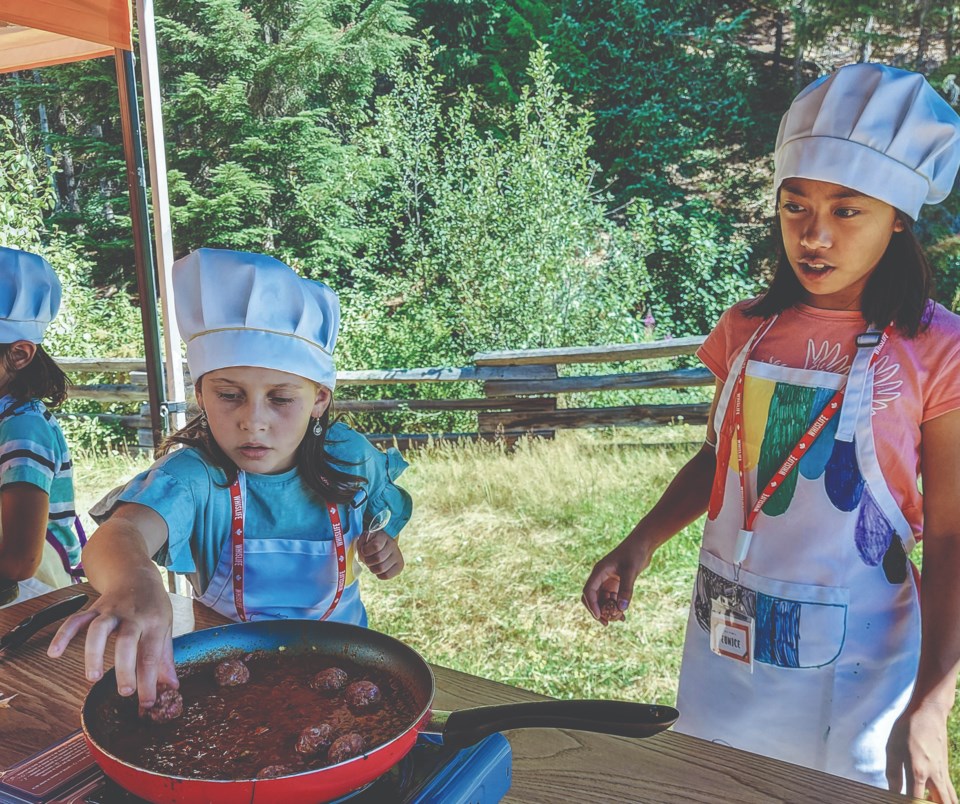Rekhai Ross Clayton is an aspiring chef. Although, to be honest, maybe “aspiring” is unfair. They say you are what you do, and he did just make one of Japan’s favourite street foods—along with five other local cooks—right before my eyes, plus he’s wearing one of those big, floppy hats, so let’s just go ahead and say, he’s definitely a chef.
Did I mention he’s only 10 years old?
Ross Clayton was one of a handful of young chefs who took part last week in the Whistler Multicultural Society’s (WMS) inaugural Multicultural Day Camps, which use a blend of food, language, games, crafts, music and dance to teach campers about the traditions and cultures of other countries.
“We don’t have many programs focused on youth and kids, and since food is a really wonderful way to get kids into a culture, we were thinking we could maybe try a summer camp, where it’s not only just the cooking, but also a culture share,” explained Chia-Ling Wu, lead camp facilitator and multicultural outreach worker with the WMS.
Over the camp’s three days, the kids learned about the cultures of Morrocco, Taiwan and Japan, with local immigrants leading the instruction. On the day I was there at the Spruce Grove Field House, they were learning how to make okonomiyaki, the beloved Japanese savoury pancake typically made from flour, eggs, cabbage and can feature a wide variety of toppings, like pork belly, shrimp, squid, green onion, ginger, mayo and pretty much anything else you want to throw on there. Originating in Osaka, the popular hangover dish enjoys a litany of regional variations, and today, the kids are making a simplified version with cabbage, slices of bold cheddar, and hearty strips of bacon, all pan-fried in a mountainous pile, the delectable aromas wafting onto the baseball diamonds nearby.
Leading the way is Nara native Emi Yoshihara, who wanted to offer a taste of Japan to the chefs of tomorrow.
“Okonomiyaki is just very popular in Japan, and it’s easy to cook. [It] doesn’t take a lot of hard work for children,” she said. “And if you go Japan, everybody knows okonomiyaki. It’s very common, popular food.”
Along with gaining the skills essential to any kitchen—organization, discipline, creativity—Yoshihara hopes introducing the kids to a dish they may not be familiar with will open them up to a whole world of possibilities.
“I think it’s more open to children to know about many cultures and the different foods of the world. They think, ‘I have a lot of choice in the future.’ You don’t need to stay in Canada, you don’t need to only eat Canadian food,” she said.
In the afternoon, the kids learned the basics of shitō-ryū karate from Yoshihara, a brown belt who trains out of the Pemberton Karate Club. Along with the obvious physical benefits, Yoshihara wants the students to walk away with some of the same positive effects the martial art has had on her over the years.
“I want to teach more [about the] culture of karate,” she said. “Karate is not only physical; it’s mental, too. I feel myself more confident. I have a very positive way to think. All my methods [are] changing, so that’s what I want to open children to.”
The camp seemed to have its intended effect, at least on Clayton, who said he wants to become a chef when he’s older “because you learn about the food and then you learn about the culture and then you can share the culture with other people.”
Grown out of the WMS’ bimonthly Multicultural Kitchen program, which, since 2015, has seen local chefs, professional and amateur alike, instructing attendees on how to make a dish from their homeland, the Multicultural Camps are intended to expand the diversity of kids’ camps available in a sports-focused town.
“We do have some culture shares, but it’s more like painting, art or the library has a book club,” Wu said. “We just wanted to do … a different kind of camp more focused on the indoors and not so much outdoors. I think that’s also one of the other reasons we had this idea.”
For more information, visit sites.google.com/wmsociety.ca/connectingcultures.




